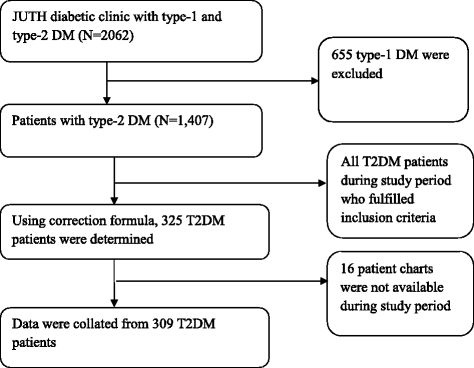Diabetes related knowledge, self-care behaviours and adherence to medications among diabetic patients in Southwest Ethiopia: a cross-sectional survey
- PMID: 27381349
- PMCID: PMC4933997
- DOI: 10.1186/s12902-016-0114-x
Diabetes related knowledge, self-care behaviours and adherence to medications among diabetic patients in Southwest Ethiopia: a cross-sectional survey
Abstract
Background: The provision of health education involving self-care and good adherence to medications has been acknowledged to be a cost effective strategy for improving quality of life of diabetes patients. We assessed levels of knowledge about type 2 diabetes mellitus (T2DM), self-care behaviours and adherence to medication among DM patients.
Methods: A facility based cross-sectional survey of 325 adults with T2DM patients attending Jimma University Teaching Hospital, Southwest Ethiopia was conducted. We used diabetes Knowledge Test, Expanded Version of the Summary of Diabetes Self-Care Activities and Morisky 8-Item medication adherence as tools to measure diabetic knowledge, self-care behaviours and adherence to medications respectively. Multinomial logistic regression analyses were used to assess the independent predictors of diabetes knowledge and adherence to medications. The binary logistic regression was applied for self-care behaviours.
Results: 309 respondents were included in the survey. Of all the respondents, 44.9 %, 20.1 % and 34.9 % had low, medium and high level diabetic knowledge respectively. High level of diabetic knowledge was the reference group. Being illiterate (AOR = 3.1, 95%CI: 1.03-9.3), having BMI <18 kg/m(2) (AOR = 6.4, 95%CI: 1.2-34.9) and duration of DM < 5 years (AOR = 4.2, 95%CI: 1.9-9.5) were significantly associated with low level of diabetic knowledge. T2DM patients who practiced good self-care (AOR = 0.5, 95%CI: 0.3-0.9) were less likely to have low knowledge. Duration of DM < 5 years (AOR = 9.8, 95%CI: 3.2-30.2) was significantly associated with medium level of diabetic knowledge. 157(50.8 %) patients had poor self-care behaviour and this was associated with level of education and adherence to medication. The proportions of patients with low, medium and high adherence to medication were 24.9 %, 37.9 % and 37.2 % respectively. Being a merchant, having medium level of diabetic knowledge and having good glycemic control level were associated with low adherence to medications.
Conclusions: Significant number of DM patients had low level of knowledge, poor self-care behaviours and low level of adherence to medications. These findings call for the need of integrated interventional management on diabetic knowledge, self-care behaviours and adherence to medications. To ensure effective T2DM management, a strategic approach that improves health literacy could be a cross cutting intervention.
Keywords: Adherence; Ethiopia; Knowledge; Self-care behaviour; Type 2 diabetes mellitus.
Figures
Similar articles
-
Diabetic health literacy and its association with glycemic control among adult patients with type 2 diabetes mellitus attending the outpatient clinic of a university hospital in Ethiopia.PLoS One. 2020 Apr 8;15(4):e0231291. doi: 10.1371/journal.pone.0231291. eCollection 2020. PLoS One. 2020. PMID: 32267893 Free PMC article.
-
Knowledge, attitude, practices and their associated factors towards diabetes mellitus among non diabetes community members of Bale Zone administrative towns, South East Ethiopia. A cross-sectional study.PLoS One. 2017 Feb 2;12(2):e0170040. doi: 10.1371/journal.pone.0170040. eCollection 2017. PLoS One. 2017. PMID: 28152066 Free PMC article.
-
Predictors of self-management practices among diabetic patients attending hospitals in western Oromia, Ethiopia.PLoS One. 2020 May 1;15(5):e0232524. doi: 10.1371/journal.pone.0232524. eCollection 2020. PLoS One. 2020. PMID: 32357177 Free PMC article.
-
A systematic review of interventions addressing adherence to anti-diabetic medications in patients with type 2 diabetes--impact on adherence.PLoS One. 2015 Feb 24;10(2):e0118296. doi: 10.1371/journal.pone.0118296. eCollection 2015. PLoS One. 2015. PMID: 25710465 Free PMC article. Review.
-
Association Between the Level of Reported Good Medication Adherence and the Geographic Location of a Patient's Residence and Presence of a Glucometer Among Adult Patients with Diabetes in Ethiopia: A Systematic and Meta-Analysis.Curr Ther Res Clin Exp. 2020 May 27;92:100585. doi: 10.1016/j.curtheres.2020.100585. eCollection 2020. Curr Ther Res Clin Exp. 2020. PMID: 32714468 Free PMC article. Review.
Cited by
-
Diabetes knowledge and foot care practices among type 2 diabetes patients attending the chronic ambulatory care unit of a public health hospital in eastern Ethiopia: a cross-sectional study.BMJ Open. 2023 Nov 28;13(11):e070023. doi: 10.1136/bmjopen-2022-070023. BMJ Open. 2023. PMID: 38016795 Free PMC article.
-
Self-care practice and associated factors among patients with diabetes mellitus on follow up at University of Gondar Referral Hospital, Gondar, Northwest Ethiopia.BMC Res Notes. 2019 Sep 18;12(1):591. doi: 10.1186/s13104-019-4630-4. BMC Res Notes. 2019. PMID: 31533833 Free PMC article.
-
Qualitative exploration into reasons for delay in seeking medical help with diabetic foot problems.Int J Qual Stud Health Well-being. 2021 Dec;16(1):1945206. doi: 10.1080/17482631.2021.1945206. Int J Qual Stud Health Well-being. 2021. PMID: 34219610 Free PMC article.
-
Self-Care Practice and Associated Factors Among Individuals with Diabetes Mellitus in Northeast Ethiopia.J Multidiscip Healthc. 2020 Dec 2;13:1817-1826. doi: 10.2147/JMDH.S288200. eCollection 2020. J Multidiscip Healthc. 2020. PMID: 33293824 Free PMC article.
-
Predictors of Diabetes Self-Care Practice Among Patients with Type 2 Diabetes in Public Hospitals in Northeastern Ethiopia: A Facility-Based Cross-Sectional Study.Diabetes Metab Syndr Obes. 2020 Sep 10;13:3137-3147. doi: 10.2147/DMSO.S273682. eCollection 2020. Diabetes Metab Syndr Obes. 2020. PMID: 32982346 Free PMC article.
References
-
- Aschner P, Beck-Nielsen H, Bennett P, Boulton A, Colagiuri R. Diabetes and impaired glucose tolerance. 5. Brussels: IDF Diabetes Atlas; 2012.
-
- IDF . Diabetes and impaired glucose tolerance. 6. Brussels: Diabetes Atlas; 2013.
-
- Harries AD, Satyanarayana S, Kumar AM, Nagaraja SB, Isaakidis P, Malhotra S, Achanta S, Naik B, Wilson N, Zachariah R, et al. Epidemiology and interaction of diabetes mellitus and tuberculosis and challenges for care: a review. Public health action. 2013;3(Suppl 1):S3–9. doi: 10.5588/pha.13.0024. - DOI - PMC - PubMed
MeSH terms
LinkOut - more resources
Full Text Sources
Other Literature Sources
Medical
Miscellaneous


